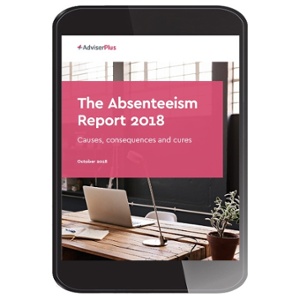Stress and absenteeism in the financial sector
In financial services, the stakes are always high, with people’s livelihoods, businesses and futures on the line.
The stresses and painful consequences of decisions were highlighted in a recent viral video showing a tearful apology to clients over losses by James Cordier, president of Florida-based OptionSellers.com.
As detailed in our Mental Health Report 2018, it is a sector that consistently sees a higher proportion of mental ill health. Every financial services HR leader we surveyed rated mental health at 7/10 or higher for importance, yet there is anecdotal evidence it isn’t always perceived that way by workers.
‘Stress is still a taboo in the City’
Karen Kwong spent 15 years working at a senior level in fund management before studying for a masters in organisational psychology and creating RenOC, an executive coaching and business change management consulting firm.
One arm of her business sees her coaching City workers one-to-one through various issues and many of those challenges stem from stress, she said.
Clients may come to her with worries over something that seems, on the surface, to be more innocuous, but when she digs down she will often find the skill they are struggling to master is as a result of reduced ability to focus because of the pressure they are under.
She believes the industry has a long way to go in regard to understanding and supporting mental wellness and flexible working. Working from home is widespread, but Karen believes employees feel under added strain to prove they’re working as hard.
She said: “This is a sector that has always had a far higher stress factor than most other industries – aside from emergency services and the military – and with recent pressures such as MiFID 2 and other regulation, as well as Brexit, the stakes have further increased.
“In the City, the culture is that if you’re still breathing, you show up to work. Don’t let any company brochure tell you otherwise. Stress is seen as something for the weak and is something that is treated as a taboo, even today.”
New research adds further weight to the issue
Perkbox research carried out this year also rated finance as the industry where workers were most likely to experience work-related stress.
The City Mental Health Alliance (CMHA) further highlighted the issue in its recently published report ‘Making It Work, building a better future for mental health in the workplace.’
The report stated that 69 per cent of the 519 UK graduates and students surveyed who were planning to apply for a job within financial, legal and professional services, described themselves as having experienced rare to severe mental health issues.
A total of 58 per cent of respondents said they had experienced anxiety, 48 per cent depression and 33 per cent said they had experienced panic attacks. Additionally, 18 per cent said they had self-harmed.
The data shows 64 per cent of young jobseekers are worried about stigma and believe telling a prospective employer about past or current mental health issue would negatively impact their chances of securing a role.
Employers are being judged on wellbeing policies

Patrick Watt, leader of the City Mental Health Alliance graduate mental health programme and Corporate Director at Bupa, said: “The results of our survey make it very clear that people planning to start careers within the traditionally stressful financial, legal and professional services industries are conscious about the potential impact on their mental health.
“They are also, quite rightly, judging a potential employer on their mental health and wellbeing policies, and these stats are a wake-up call to law firms, banks, insurance companies and accountancy firms who aren’t prioritising mental health across the country.”
Find further insight in our free absenteeism report
Indeed, the vital importance of a workplace health strategy formed part of one of seven conclusions within our free 2018 absenteeism report ‘The Absenteeism Report 2018: Causes, consequences and cures.’
Organisations who care about their culture are much more likely to have an inclusion strategy and one element of that is health management. They’re saying ‘here in our business, everyone is welcome and we care about the welfare of our people’.
Director of AdviserPlus Learning Solutions Pat Ashworth said in the report
The report explores:
- The role of the workplace environment
- Practical ways businesses can and should react to absence
- Holiday and flexitime
- The role of technology
- The trends you need to understand
Download it free via: The Absenteeism Report 2018: Causes, consequences and cures.